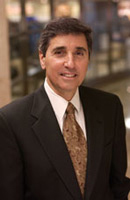
Supply chain management in health care: New research focus
Eugene Schneller has been at the lead of research initiatives concerning the emergence of supply chain management in healthcare organizations. Recently Schneller talked with KnowWPCarey about the ways supply chain management can positively impact the revenue cycle and how healthcare reform is driving change. The Health Sector Supply Chain Research Consortium (HSRC-ASU) is a research group within the department of supply chain management at the W. P. Carey School of Business.






